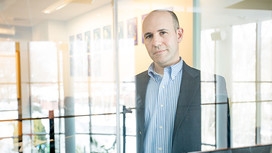
As a graduate student in the late 1990s, Andy Molinsky worked at an agency in Boston helping Russian immigrants find jobs in the US. The applicants were well-qualified but they struggled during interviews. They intellectually understood the cultural customs of the typical US job interview – smile, make eye contact and engage in small talk – but they found it hard to do so because it went against their culturally ingrained behaviour.
20世紀90年代末,還是研究生的安迪•莫林斯基(Andy Molinsky,見右圖)曾供職于波士頓的一家中介,幫助俄羅斯移民在美國找到工作。俄羅斯求職者的素質不錯,但他們在面試時總感覺不自在。他們雖然知道典型的美國招聘面試需要遵循的文化習慣,例如微笑、有目光接觸、和對方輕松地閑聊,但他們發現自己很難做到這些,因為這些與他們深受本民族文化影響的行為方式是抵觸的。
Now an associate professor of organisational behaviour at Brandeis International Business School, Massachusetts, Prof Molinsky was motivated to learn more about overcoming the challenges of cultural identity in the workplace. His book Global Dexterity (Harvard Business School Press) aims to help managers learn how to culturally code-switch when working in an international setting.
如今,已是馬薩諸塞州布蘭迪斯國際商學院(Brandeis International Business School)組織行為學副教授的莫林斯基,致力于在克服工作環境中的文化認同障礙方面,做出更多探索。他的新作《全球變通力》(Global Dexterity,哈佛商學院出版社出版)旨在幫助管理人員學會在國際環境中如何進行文化轉換和調整。
What is global dexterity?
何為全球變通力?
It’s the ability to adapt your behaviour across cultures without losing yourself in the process – fitting in without giving in. When you’re making your way in an international culture you will find yourself in situations where how you would act in your native culture is different from the way you are expected to act in your new culture. This could range from how you pitch yourself to an investor, to how you motivate employees, to how you give performance feedback.
全球變通力是在不同文化間調整行為方式、但同時避免迷失自我的能力——融入但不喪失自我。當你行走在一個國際文化的環境中時會發現,按本國文化做事情的方式,與你在新的文化中應該遵循的做事方式是不同的。這種情況可能出現在如何向投資者推銷你自己、如何激勵員工,以及如何進行業績反饋等問題上。
Why is global dexterity a ‘critical skill’ for today’s managers?
為什么全球變通力對今天的管理人員來說是一項“重要技能”?
Everything you need to do in order to do your job well has the potential to vary across cultures. So you need the ability to not only diagnose and understand these differences but also to be able to shift and adjust your behaviour accordingly. If you don’t, you risk being ineffective: you won’t be able to achieve your goals or the goals of the business.
人們為了做好工作而需要做的每件事,都可能在不同的文化中有所變化。因此,需要的不僅是辨別和理解這些差異的能力,還有相應地轉變和調整行為的能力。如果你不具備上述能力,則可能面臨行動無果的風險:你將不能完成個人或公司的目標。
舉例說明
Take one of my MBA students from Beijing going to a networking event on campus with potential employers. He is aware of the US-style assertiveness and self-promotional behaviour necessary. He knows that Americans openly tout their skills and accomplishments and are less deferential to potential employers. But for the Beijing student the real challenge is adapting his behaviour because it goes against the notions of power and respect ingrained in him since he was a kid. Some international students have told me they avoid going to career fairs because it’s so uncomfortable for them.
拿我的一個來自北京的MBA學生為例,他準備參加一次校園商業社交活動,其中有他潛在的雇主。他知道有必要表現出美國式的強烈自信,并積極自我推銷。他也知道美國人會公開吹噓自己的經驗成就,并且不會對潛在的雇主畢恭畢敬。但這與他從小就根植在腦子里的尊敬權力的意識是相抵觸的,因此,調整行為對他確實是一個艱難的挑戰。一些國際學生曾對我說,他們躲避參加招聘會,因為那里讓他們很不舒服。
How do you master global dexterity?
如何掌握全球變通力?
It’s about customising a style that works for you. Sometimes it requires eliminating certain behaviours, other times it can be something as small as a linguistic change. For example, in Russia, consulting firms are very hierarchical. You don’t necessarily vie for projects – you’re slotted into them. One Russian student realised her US colleagues were advocating for themselves and she was losing out on the best work. But telling her boss, “I’d love to work on this project”, felt too difficult for her. Her solution was to customise her language and ask: “Can I be helpful on this project?”.
要領在于形成一套對你有效的特定行為方式。有時它要求你避免某些行為,有時則可能只是語言調整這類小的改變。舉個例子。在俄羅斯,咨詢公司內部等級森嚴。你不需要主動爭取加入項目,而只需要被動地被安排進項目里。一個俄羅斯學生意識到,她的美國同事在不斷通過毛遂自薦的方式來爭取各種機會,而她卻在慢慢失去最好的項目。但對她來說,告訴老板“我很愿意做這個項目”是太困難的事了。她的解決辦法是,調整語言,用提問的方式說:“對這個項目,我能幫上什么忙嗎?”
Are some better at this than others?
是不是有些人的變通能力更強?
There are some people who are naturally more socially skilled and attuned to social and cultural cues. But there are many individuals who aren’t able to do that as easily. I strongly believe anyone can learn this stuff. It’s a skill; there’s no global dexterity gene.
有些人天生就有比別人更強的社交能力,以及對不同社會和文化的適應能力。但很多人并不能輕松地做到這些。我堅信,任何人都可以學習這些能力。這是一種經驗;全球變通力不是天生的。
Are business schools missing an opportunity here?
在這方面商學院是否有個機會沒抓住?
A lot of business schools do short-term immersion trips and have this idea that: “We are global. We send you abroad. By osmosis you’ll learn from people of other cultures.” This is a nice first step but it doesn’t equip people to be effective global leaders. There’s no framework or tools. We need to sensitise people to these issues.
許多商學院設立了短期的浸入式學習之旅,它們認為:“我們是國際化的商學院,我們把你送到國外去。通過耳濡目染的影響,你會從其他文化的人身上學到東西。”這是很好的第一步,但出國并沒有讓人們具備成為有效的全球領導者的能力,因為它缺少框架或工具。我們需要讓人們更敏感地意識到這些問題。












